- Home
- Lauren Tarshis
I Survived the Galveston Hurricane, 1900 Page 5
I Survived the Galveston Hurricane, 1900 Read online
Page 5
Something flew by Charlie — a brick or a roof tile, maybe — and nicked him on his chin. He cried out, then lay back down, pressing his cheek to the wet, cold wood of his door raft.
The wind shrieked.
Whoo-eeeeeesh! Whoo-eeeeeesh! Whoo-eeeeeesh!
And in between gusts, Charlie heard a shout.
“Help me! Over here!”
The waves pushed his raft closer to the shouts. It was a person, clinging to what looked like part of a wagon.
“Help me!”
Charlie managed to slow down his raft.
A sliver of moonlight lit up the person’s face for a second.
It was the face that had haunted Charlie’s dreams.
The wind screamed.
Whoo-eeeeeeeesh!
“Gordon?” Charlie said.
Whoo-eeeeeeeesh!
“Charlie?”
Charlie hesitated for a few seconds. This was the person who had thrown a rat at him, who had almost stabbed him with a stick.
But this was also the boy who had a papa who screamed at him. Who called him weak. Who made him cry in the middle of a hurricane.
Most of all, Gordon was a just a kid — scared and alone in the middle of this nightmare.
Like Charlie.
Charlie made room on the door, and Gordon climbed on.
They rode the waves for a few seconds, and then a huge piece of metal fence smacked Charlie in the shoulder and pushed him into the water. The waves grabbed him — but so did Gordon. He gripped Charlie’s arm and pulled him back up. The door bobbed up and down, barely keeping them afloat.
They needed something bigger, stronger.
“There!” Gordon shouted. Another large shape was coming toward them — it looked like part of a roof. They clung to the door. And just as the roof sailed by, they managed to scramble onto it.
It felt more solid than the door. But the waves were already clawing it apart. It wouldn’t last long.
Whoo-eeeeeeeesh! Whizzzzzz!
The wind was shooting bricks and tiles at them.
“Keep your head down!” Charlie cried out.
Whoo-eeeeeeeesh! Whizzzzzz!
But even lying flat, they weren’t safe. Charlie thought of Grandpa’s stories of the Battle of San Jacinto, the bullets and cannonballs flying everywhere. He remembered how at one point Grandpa was trapped in a field. But he found a big fallen branch and managed to hide behind it.
He and Gordon needed something to protect their heads and backs. There was so much wreckage in the water. It didn’t take long to spot a flat piece of wood.
“Gordon! Grab that.”
A minute later, they’d figured out how they could lie next to each other on their stomachs, each holding an edge of the board so it covered them. Like a shield.
Charlie felt safer. But now that he didn’t have to think about getting his head smashed in, other thoughts filled his mind. A new kind of terror gripped his heart.
Mama and Papa and Lulu. Were they safe? Was that house he’d seen the Pottses’ house? And even if it was standing then, was it still standing now?
Boom! Boom! Boom!
And now there was thunder.
Flash!
And lightning.
Tears sprang into Charlie’s eyes as he thought of Lulu.
“Please,” Charlie whispered. “Please let her be safe. Let them all be safe.”
He closed his eyes and imagined Lulu wrapped up in Mama’s arms, with Papa hovering over them both.
Please. Please. Please, Charlie prayed. Let them be safe. Let them be safe.
Lightning flashed once again. Charlie opened his eyes as the flashes lit up the horrors all around.
Flash! A house on its side.
Flash! A woman clinging to a crumbling hunk of wood.
Flash! A smashed boat.
Flash! A massive wooden pole, speeding through the water.
Heading right for them.
The pole slammed into their raft, smashing it apart. Charlie tumbled into the water. He went down, down, down — this water had to be twenty feet deep. Finally, Charlie’s feet hit the ground, and he pushed off. But he only made it a few feet before something stopped him. And this time it wasn’t just a piece of rope. It wasn’t a snake, either.
Charlie fumbled with his fingers and felt a tangle of thin wire.
He kicked and kicked, but the wire wrapped itself tighter around his calves.
No! He reached down and tugged hard, kicking more frantically. But now the wire was digging into his flesh.
It was hopeless.
This was it.
And it was so quiet down here. The wind wasn’t shrieking. Those glass shards of rain weren’t stabbing his face. No flying bricks or stones or tiles could smack him in the face.
Charlie relaxed. Maybe he should just give up. He imagined himself rising up peacefully, like that floating woman … up, up, up out of the water, up, up, up above those thick clouds.
He let his body go completely limp.
And then he was rising up. Wait! The wires had loosened! He started kicking as hard as he could again. The wires tightened. His chest was about to explode.
A thought whispered from the back of his head — something he’d heard. No, something he’d read. In Meraki’s book. That new magician, Houdini.
One must not panic or struggle when trying to get free from a rope …
Charlie stopped kicking. His lungs felt crushed. His eyeballs felt like they were going to pop from his skull. But he somehow kept very still. He felt the wires loosening. With just the slightest wriggle of his legs, Charlie was free. Like magic.
He dropped down deeper so he could push off the bottom. With every ounce of strength he had left, he rocketed himself up, pushing away the wreckage in his path.
He broke through the surface, sucking in the air. Wind actually blew into his mouth, filling his lungs. He heard someone shouting his name.
“Charlie!”
“Gordon!”
Gordon was clinging to a new raft — a chunk of wall.
He reached out with both arms and heaved Charlie up. But this new raft was breaking up quickly, too. They had to find something strong, something that could keep them safe until all this stopped.
Flash!
Charlie saw it — a big tree that was somehow still standing.
He heard Mr. Early’s voice in his mind.
“That tree — that’s how I got through … managed to hang on until the sun came up.”
“Gordon! Kick! To that tree!”
They both kicked with all their might. But the water pushed them away from the tree.
“Harder!” Charlie cried.
They kicked and kicked. Slowly they inched toward the tree.
After what seemed like hours, they were finally only a few feet away.
“On three,” Charlie shouted. “One, two, three!”
They both let go of the raft and threw themselves at the tree.
Whoo-eeeeeeeesh!
The wind tried to knock them back, but they both managed to take hold of a branch. They climbed higher and nestled themselves between two thick limbs. The wind was hurling its bullets and cannonballs. But the tree seemed to wrap its strong arms around them. The water tried to snatch them back. But it couldn’t reach them. He and Gordon leaned heavily against each other. Charlie held on to his branch with all his might.
The hours wore on. The wind shrieked. The rain poured down. The lightning flashed. Charlie’s arms were so tired. More than once, he just wanted to let go, to slip down like a coin in a French drop, to fall into the quiet deep of the churning sea.
He was so tired and scared.
But he thought of Mama and Papa and Lulu. He told himself they were safe. That they were waiting for him, praying for him like he was praying for them.
And each time he felt himself slip from that tree, he held on tighter. He heard a voice whispering through his mind.
You are strong.
It wasn
’t Meraki’s voice or Sarah’s. It wasn’t Mr. Early’s or Grandpa’s or even Mama’s or Papa’s.
At first Charlie wasn’t sure whose voice it was.
And then it came to him:
It was his own.
Sometime after midnight, the pounding rain had slowed to a drizzle. The wind’s shrieking roar had dropped to a moan, and finally a whisper. With shocking speed, the water had drained away.
When the sun started to rise, Charlie and Gordon climbed down from the tree. They stood together in the mud. Charlie stared at the shattered land around them. He turned in every direction, staring at the mountains of rubble, the heaps of wood that covered the ground as far as he could see.
Gordon gripped Charlie’s hand. Neither of them spoke.
Impossible, Charlie told himself.
None of this was real.
Not the wrecked houses lying like smashed eggs. Not the people, dazed, bloodied, weeping.
No. This wasn’t real. Charlie saw it. But he wouldn’t believe it. Because what he was seeing was impossible.
He and Gordon started to walk. Each time Charlie saw something new, that word screamed through his mind.
The woman sobbing as she clawed through what was left of a house.
Impossible.
The pile of stones where a church had once stood.
Impossible.
A mountain of wreckage in the distance, taller than any building, stretching for blocks and blocks to the gulf.
Impossible.
The hand poking out from under a pile of wood.
Impossible.
This was all a trick. An evil, terrible trick. A trick on his eyes. His ears. His heart.
He thought only of his family. It was their faces he kept in his mind as he and Gordon tried to make their way back to Broadway. It took a very long time.
But finally, there was Gordon’s house — still standing, though sagging, with parts of the roof and walls missing.
Mr. Potts was on the steps. He let out a sob of joy when he saw Gordon.
“Son!”
Gordon staggered forward, and his father grabbed him and lifted him off the ground. Mrs. Potts appeared and rushed to join them.
But Charlie just stood there. Where were Mama and Papa and Lulu?
Charlie dropped his eyes. His mind started to spin.
And then …
“Chowie!”
Charlie looked up. Papa was running toward him. Mama was right behind him, carrying Lulu. Charlie fell to his knees. It seemed he’d been floating through the air, twisting and turning in those dark clouds. But now somehow he’d made it back onto the ground.
Arms came around him.
They were all safe.
It was impossible.
It was true.
Loud noises rose up all around Charlie.
Balls bouncing. A piano playing. Kids laughing. Sarah’s voice.
“Charlie!”
Charlie turned from the window. Sarah grinned at him as she tightened the laces of her tap shoes.
“Don’t you think you should get ready? You’re going onstage first!”
It was the night of the school talent show, and they were backstage, in the school auditorium. Their teacher, Mrs. Butler, was helping one of the girls fasten a ribbon into her hair.
“It’s crowded out there,” said Charlie’s new friend Lee, bouncing one of the balls he’d be juggling in his act.
Rosemary Cline walked over to Charlie. She was singing a song in the show. “Charlie,” she said, smiling. “Your mustache is crooked.”
She was talking about the fake mustache Mama had made for him, out of some scraps of fabric — he had wanted a mustache like Meraki’s. Charlie thanked Rosemary and went to the mirror next to the window.
He realized now that his mustache actually looked like a very sick caterpillar. And it itched. Charlie peeled it off and tossed it in the trash.
He peered into the mirror again, relieved to see his familiar freckled face. He was still getting used to the big scar on his chin — from a flying roof tile. The scar turned bright red when he got cold, but it didn’t hurt anymore.
He had bigger scars. His body was covered with jagged lines, puckers, and dents, all from his time in the churning water. Charlie closed his eyes and tried to stop the swirl of memories. But he suddenly felt like he was floating, like he was in the air, spinning, twisting, unable to get himself back onto solid ground. It happened all the time lately. At school. At the dinner table. On the street. He’d suddenly feel far away, back in those terrible hours and days after the storm.
And now his mind swirled with the nightmare memories — the sobs of neighbors, the sight of their shattered house. Standing in line in the roasting heat, waiting for bread and drinkable water. Sleeping on the floor of the church. The terrible smells that rose from the wreckage.
Charlie tried to remember how lucky he was. Unlike thousands of other people, he’d made it out of the water that night.
Nobody knew exactly how many thousands had died. Six thousand? Eight thousand? And that was just on Galveston Island. It was impossible to know because so many had been swept out to sea. Entire families were gone.
And Galveston — more than half the city had been completely destroyed. Houses and buildings. Churches. Schools. Stores. Blocks and blocks along the beach had been scraped clean by the raging sea, everything smashed up and pushed into a giant mountain. That’s what he and Gordon had seen when they had climbed down from the tree.
After ten days, Mama and Charlie and Lulu left the city along with most of Galveston’s women and children. They took a crowded barge across the bay. Mama took them to Houston to stay with her cousins.
Papa stayed behind — they needed men to clear away wreckage.
When Mama brought Charlie and Lulu back to the city, three months later, almost all the rubble was gone. Charlie was shocked to see trains chugging across the bay again. Wagons and buggies and carriages crowded the streets. The sounds of hammers and saws drifted through the air. The streetcar dinged.
School opened right before Christmas.
A firm hand took hold of his shoulder. He felt a jolt, like he was waking up from a dream. And there was Sarah, right in front of him, watching him with her gleaming eyes. “You all right?” she asked.
Charlie had never told her about the floating. But somehow she always knew how to bring him back. She kept her hand on his shoulder, gripping it tightly, as though she was holding him down to the ground.
It took a moment for Charlie’s mind to stop swirling. He looked out the window again.
The sky was bright, with just a few puffy clouds. In the distance was the Gulf, silvery blue, calm as a pond.
Charlie nodded to Sarah.
Mrs. Butler rushed over. “Ready for you, Charlie!”
Charlie patted his pockets, making sure he had his cards and coins.
Lee and Rosemary wished him luck. Other kids smiled and waved.
“Go, Charlie!”
“You’ll be great!”
Charlie walked slowly onto the stage. The auditorium erupted into cheers and applause.
“Chowie!” a voice shrieked.
There was Lulu on Mama’s lap, waving like a maniac from the front row. Mama beamed up at him. Papa’s eyes sparkled with pride.
Behind them were Mr. and Mrs. Potts. They both waved — Mr. Potts was almost smiling. And Gordon … he grinned and waved, too.
They were friends now — how could they not be after what they’d been through? Gordon had apologized about the rat and the pointed branch, over and over. Charlie forgave him — and told him his whole cockroach plan. Gordon laughed his head off.
The applause died down.
Charlie just stood there, staring out at the audience, at all these people. Somehow they’d made it through the storm.
Impossible.
But so many were missing — parents, grandparents, kids he’d known his whole life. Mr. Early hadn’t made it, either. T
hey were all gone forever.
Impossible.
Charlie got that floating feeling again. But his eyes caught Lulu’s. And then Mama’s and Papa’s.
He clenched his fists and lifted his chin. He stepped forward, into a circle of glittering light, and took a breath.
“Ladies and gentlemen,” he shouted, in his loudest, clearest voice. “I am Charles the Great!”
People swimming near the Pagoda Bathhouse, in 1895.
Galveston’s beach today. The Pagoda was never rebuilt. But the Pleasure Pier attracts fun seekers from around the U.S.
Dear Readers,
Kids often ask me how I decide what events to write about in the I Survived series. It’s a great question, because I have written about many kinds of events — natural disasters and wars, accidents and attacks. Some are famous — like the American Revolution. Others are little known, like the Great Boston Molasses Flood.
I find ideas everywhere — books I read, places I travel to, museums I explore, and, best of all, readers like you. There are so many fascinating and important topics.
So how do I choose?
I look for events that changed our world or our ideas. The American Revolution, of course, led to the United States becoming its own country. The Boston Molasses Flood led to laws that make the buildings we live in today safer.
Market Street in Galveston’s downtown, in 1894. Look closely and you’ll see the streetcar coming toward you. What else do you notice?
So what about the Galveston hurricane?
Of course the storm changed the lives of everyone who was in Galveston on that terrible day. Thousands died. Thousands more were injured and lost their homes.
The storm also changed the history of Texas. Until September 8, 1900, Galveston was the fastest-growing city in the American South. Galveston was locked in a competition with Houston to become the third-largest city in Texas, and Galveston was about to take the lead.
Following the storm, Galveston was rebuilt with shocking speed. But it never regained its former place as a powerful Texas city. Today, Houston is the biggest city in Texas by far (about 2,300,000 people lived there). San Antonio is second, Dallas a close third, followed by Austin, the Texas capital.

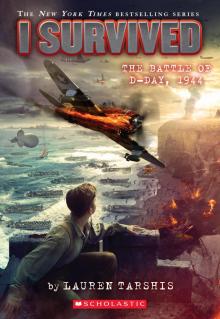 I Survived the Battle of D-Day, 1944 (I Survived #18)
I Survived the Battle of D-Day, 1944 (I Survived #18)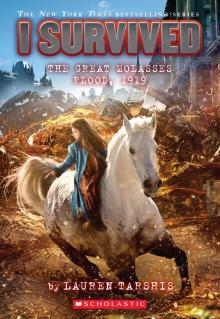 I Survived the Great Molasses Flood, 1919
I Survived the Great Molasses Flood, 1919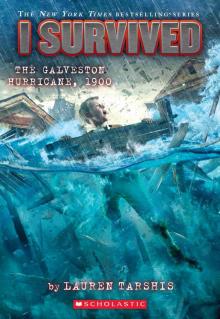 I Survived the Galveston Hurricane, 1900
I Survived the Galveston Hurricane, 1900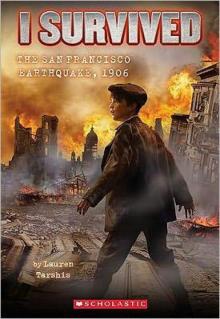 I Survived the San Francisco Earthquake, 1906
I Survived the San Francisco Earthquake, 1906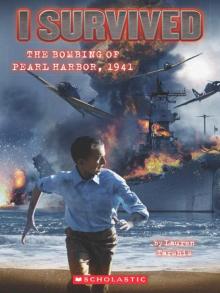 I Survived #4: I Survived the Bombing of Pearl Harbor, 1941
I Survived #4: I Survived the Bombing of Pearl Harbor, 1941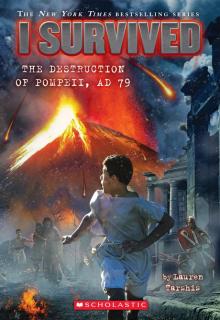 I Survived the Destruction of Pompeii, AD 79
I Survived the Destruction of Pompeii, AD 79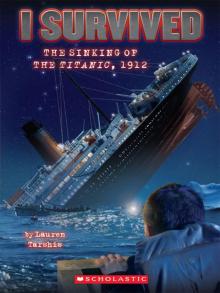 I Survived #1: I Survived the Sinking of the Titanic, 1912
I Survived #1: I Survived the Sinking of the Titanic, 1912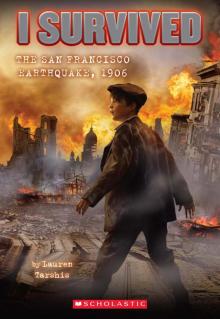 I Survived #5: I Survived the San Francisco Earthquake, 1906
I Survived #5: I Survived the San Francisco Earthquake, 1906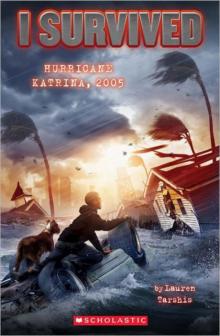 I Survived Hurricane Katrina, 2005
I Survived Hurricane Katrina, 2005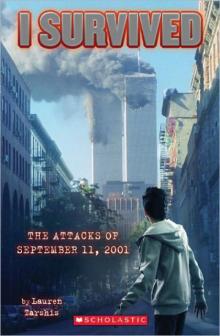 I Survived the Attacks of September 11th, 2001
I Survived the Attacks of September 11th, 2001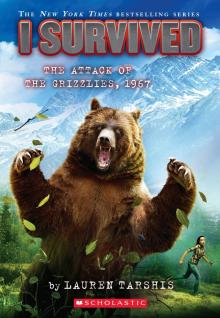 I Survived the Attack of the Grizzlies, 1967
I Survived the Attack of the Grizzlies, 1967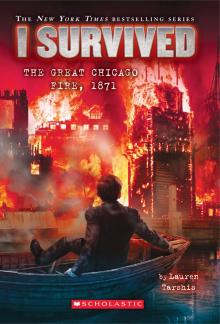 I Survived the Great Chicago Fire, 1871
I Survived the Great Chicago Fire, 1871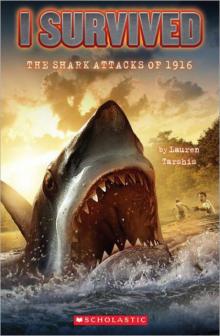 I Survived the Shark Attacks of 1916
I Survived the Shark Attacks of 1916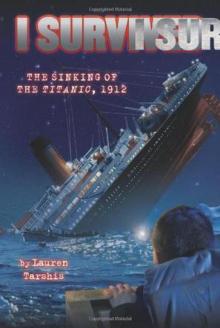 I Survived the Sinking of the Titanic, 1912
I Survived the Sinking of the Titanic, 1912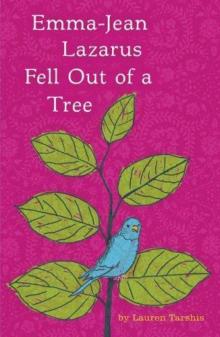 Emma-Jean Lazarus Fell Out of a Tree
Emma-Jean Lazarus Fell Out of a Tree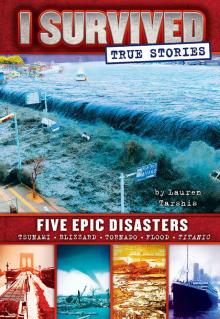 I Survived True Stories: Five Epic Disasters
I Survived True Stories: Five Epic Disasters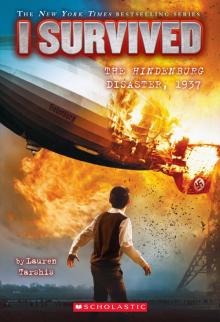 I Survived the Hindenburg Disaster, 1937
I Survived the Hindenburg Disaster, 1937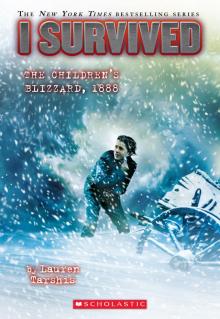 I Survived the Children's Blizzard, 1888
I Survived the Children's Blizzard, 1888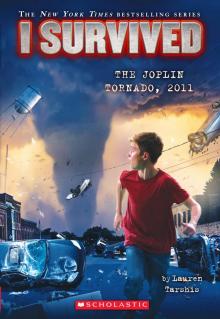 I Survived the Joplin Tornado, 2011
I Survived the Joplin Tornado, 2011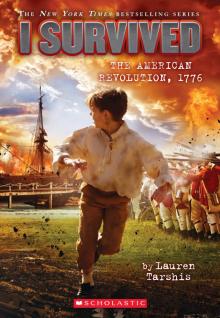 I Survived the American Revolution, 1776
I Survived the American Revolution, 1776 Emma Jean Lazarus Fell in Love
Emma Jean Lazarus Fell in Love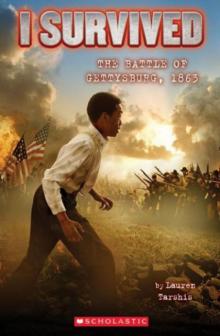 I Survived the Battle of Gettysburg, 1863
I Survived the Battle of Gettysburg, 1863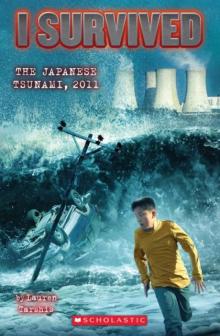 I Survived the Japanese Tsunami, 2011
I Survived the Japanese Tsunami, 2011